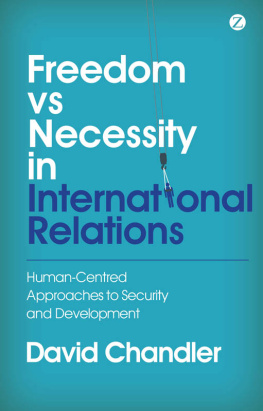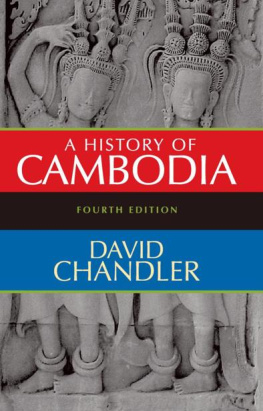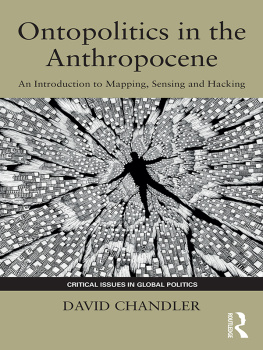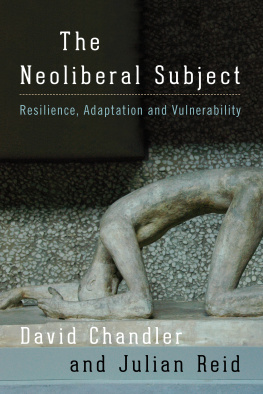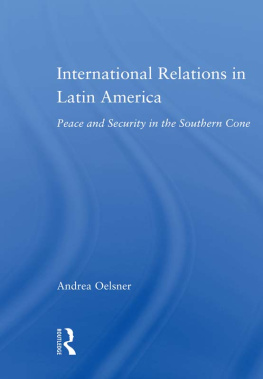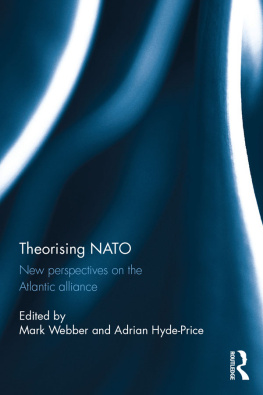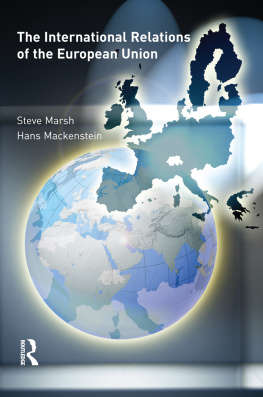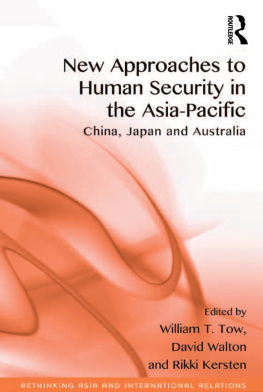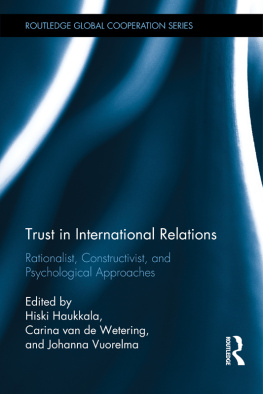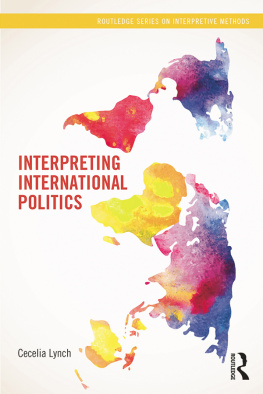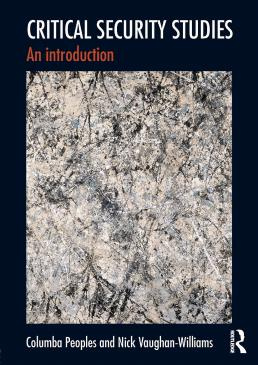About the author
David Chandler is professor of international relations and research director of the Centre for the Study of Democracy, University of Westminster. He is the author of several books and edits the journal Resilience: International Policies, Practices and Discourses.
FREEDOM VERSUS NECESSITY IN INTERNATIONAL RELATIONS
HUMAN-CENTRED APPROACHES TO SECURITY AND DEVELOPMENT
David Chandler
Zed Books
LONDON | NEW YORK
Freedom versus Necessity in International Relations: Human-centred Approaches to Security and Development was first published in 2013 by Zed Books Ltd, 7 Cynthia Street, London N1 9JF, UK and Room 400, 175 Fifth Avenue, New York, NY 10010, USA
www.zedbooks.co.uk
Copyright David Chandler 2013
The right of David Chandler to be identified as the author of this work has been asserted by him in accordance with the Copyright, Designs and Patents Act, 1988
Set in Monotype Plantin and FFKievit by Ewan Smith, London
Index:
Cover designed by www.rawshock.co.uk
All rights reserved. No part of this publication may be reproduced, stored in a retrieval system or transmitted in any form or by any means, electronic, mechanical, photocopying or otherwise, without the prior permission of Zed Books Ltd.
A catalogue record for this book is available from the British Library Library of Congress Cataloging in Publication Data available
ISBN 978 1 78032 486 9
CONTENTS
ACKNOWLEDGEMENTS
This book would not have been possible without the stimulating working environment provided to me over many years by the Centre for the Study of Democracy and the Department of Politics and International Relations at the University of Westminster. In addition, I would like to thank Naeem Inayatullah, who provided an initiating insight; Jonathan Joseph and Michele Ledda, for their comments on the draft; Ken Barlow and the team at Zed Books; and the two people I have gained from most, through discussions and disagreements in the course of preparing and writing this book, Julian Reid and Paulina Tambakaki.
Parts of this book draw on recently published or forthcoming material as well as conference papers and lecture presentations. is based upon work developed in the paper Insecure subjects: vulnerability, empowerment and resilience, prepared for Vulnerability: a symposium, University of Otago, Dunedin, New Zealand, in November 2010; The rise of resilience: rethinking agency and governance intrventions, a seminar presentation at the University of St Andrews, in April 2011; and the paper International statebuilding and the inculcation of resilience, presented at the workshop Resilient futures: the politics of preventive security, at the University of Warwick, in June 2011. It also draws from material in the forthcoming article in the journal International Political Sociology, Resilience and the autotelic subject: towards a critique of the societalization of security.
is based on material prepared for the workshop Interrogating the use of norms in international relations, organized by the International Political Sociology Working Group at the International Studies Association convention, Montreal, Canada, in March 2011, and the forthcoming article in the journal Democratization, Promoting democratic norms? Social constructivism and the subjective limits to liberalism.
is an amended version of the paper Our morals and theirs: politics beyond the biopolitical subject, presented at the international symposium, Politics beyond the biopolitical subject, Griffith University, Brisbane, Australia, in December 2011. I would, of course, like to thank all those involved in generously inviting, hosting and funding these opportunities to discuss and develop the work presented in this book, particularly the generous support of the Finnish Academy funded research project Governing life globally: the biopolitics of development and security, led by Professor Julian Reid at the University of Lapland.
At first we call particular acts good and evil without consideration of their motives Then we assign the goodness or evil to the motives We go even further and cease to give to the particular motive the predicate good or evil, but give it rather to the whole nature of man; the motive grows out of him as a plant grows out of the earth. So we make man responsible for the effects of his actions, then for his actions, then for his motives and finally for his nature. Ultimately we discover that his nature cannot be responsible either, in that it is itself an inevitable consequence, an outgrowth of the elements and influences of past and present things; that is, man cannot be made responsible for anything, neither for his nature, nor his motives, nor his actions, nor the effects of his actions.
Nietzsche, aphorism 39, Human, All Too Human
1 | INTRODUCTION: THE SUBJECT OF GOVERNANCE
Introduction
This book intends to break new ground in analysing the consequences of conceiving the world in human- or agent-centred terms. While placing the human agent or actor at the centre of the world is often understood to be progressive and empowering, this is very far from the case. Human-centred approaches start with the individual or community, often conceived as vulnerable and insecure, and consider ways in which individuals and communities can become empowered or capacity-built in order to have the agency to better cope with, withstand or challenge the vicissitudes of our global and complex world. This book makes the simple point that focusing on the inculcation of individual and community agency, ethical reflectivity or resilience, as a way of addressing problems of insecurity, conflict or development, tends to see the human subject as the problem, rather than the material social and economic relations within which it is embedded. In fact, once human agency is seen as the level at which problems can be resolved, material and structural constraints fade into the background or are seen as merely a product of poor behavioural choices. The focus on the differential subjective or cognitive aspects of human agency, and their social and cultural institutional constraints, in this way has replaced the rationalist understanding of the universal subject operating in specific social, economic and political circumstances.
The declaration that we are humans, radically proclaimed as if it were some new discovery, is a call for the recognition that the problems of the world need to be understood in the context of our richness and diversity: in the fact that we are emotional, social and complex beings, embedded in a world which is continually subject to change. This sounds like an empowering and radical shift, especially when discursively posed in contradistinction to a neoliberal rational-choice understanding of humans as rational calculators of self-interest with no normative considerations for others (: 7).
: 81). The difference between Marxs time and today, of course, is that Marx wanted to extend the sphere of human freedom by revealing the coercive constraints of the structuring social relations operating beneath the surface of free market appearances. Today the purpose is entirely the opposite; instead we are told that it is our human qualities, our distinct social, emotional and cognitive flaws and fallibilities, which explain why our freedoms need to be carefully managed and why our choice-making necessitates facilitative and empowering governance intervention.
Of course, it could be argued that an analytical focus on human agency and choice-making possibilities holds out the promise of social transformation, whereas the focus on historical, social, economic and structural constraints acts to rationalize or legitimize inequalities and differences. In fact, it is increasingly held that placing analytical emphasis on structural constraints limits the space for human agency and restricts the subjective choices available, thereby constraining possibilities for progress. This book seeks to argue the opposite: that, in fact, human-centred approaches to the problems of insecurity, conflict and development close down the possibilities for human freedom. Human-centred approaches limit the possibilities of social transformation because the problems are located in the behaviour and decisions of those considered to be the most vulnerable or insecure. The focus on empowering and capacity- and capability-building individuals and communities held to be at risk emphasizes their need to develop, change or adapt to enable them to cope with, to survive, or to thrive in the world. The world as it exists is understood to be open to change and transformation, but increasingly this transformation is seen to be centred on human practices and understanding. In this way, the human becomes the determinant focus rather than the external world beyond the subject. Increasingly, rather than focusing on the problems of the external world, the inner world of the subject becomes the focus for aspirations of social transformation.


